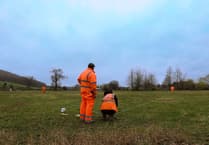A farmer with fields of daffodils at Fedwlydan, Glasbury-on-Wye, is finding a link between the yellow flower and a slowing down of Alzheimer's.
Kevin Stephens has spent years growing daffodils in his farm. By extracting the plant alkaloid galanthamine, this compound is an approved treatment for slowing down the progress of Alzheimer’s disease and vascular dementia. It is the reason why daffodils are such an important part of Kevin’s business.
“We have to separate the galanthamine from the biomass, but it is the most awkward substrate to work with, it won’t filter, settle, boil, centrifuge, that’s why it has taken so long to get to where we are now.”
In 2008, Kevin made a phone call to scientist Professor Trevor Walker. Kevin had read an article on research by Professor Walker in conjunction with the Institute of Grassland and Environmental Research at Aberystwyth; growing daffodils at altitude had been shown to stimulate the production of galanthamine, the so-called ‘Black Mountain effect’.
At 1,200 feet, Kevin’s fields are not short on altitude.
He called Professor Walker. “I got conscripted into making it happen and 14 years later, Trevor has retired and I’m still bashing away at it,” says Kevin.
That ‘bashing away’ is the work he is doing at Agroceutical Products, the bio-research firm he established in 2012 to commercialise Professor Walker’s research.
It has been a frustrating process because before Kevin can secure a contract from a pharmaceutical company he needs to show that he can produce hundreds of kilograms of galanthamine.
“It is a chicken and egg situation, we can’t get to the point where we can deliver that volume until we get investors, but we can’t get investors until we get a contract from a pharmaceutical company,” he explains.
But this year will mark a breakthrough in part, with the launch of what Kevin is calling a ‘brain health pill’, an over-the-counter supplement he has developed with a Canadian neuroscience company.
“It is a way of breaking the cycle we are in with investors and the pharmaceutical companies,” says Kevin.
He is fully prepared for initial sales to be slow because it is a new product but matching the increase in production to increasing demand for the new product is the key to breaking that chicken and egg position, he says. “Our plan isn’t to go from zero to hero in a single bound.
“Our research and development has taken a lot of time, so it is very exciting to get to the point where we have a product coming to the market.”
It has been years in the making and Kevin has persevered when others would have given up, but he is both a farmer and an entrepreneur.
Kevin hopes he can generate a new income stream for hill farms similar to his. Once the galanthamine project is commercialised he will provide opportunities for farmers to grow daffodils to supply the business.
With the Wales Farm Business Survey year-on-year consistently showing that hill cattle and sheep farms just couldn’t survive without the Basic Payment Scheme (BPS), growing daffodils would be a form of diversification when that subsidy ends.
He is very close to being able to roll out the commercial growing of daffodils to other farmers. “We have deliberately not pushed the growing side until the customer call-off has been established,” he says.
His vision is to have geographical clusters of growers planting a small acreage rather than one or two large-scale growers.
Despite all the many plates he is spinning, Kevin remains a farmer at heart. “I still get up at 6am to feed the sheep, farming is a way of life.”




